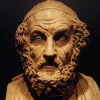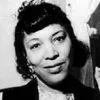CHORUS: But fairy tales that scare us humans
are useful for religion.[ΧΟΡΟΣ: φοβεροὶ δὲ βροτοῖσι μῦ-
θοι κέρδος πρὸς θεῶν θεραπεί-
αν.]Euripides (485?-406? BC) Greek tragic dramatist
Electra [Ἠλέκτρα], l. 743ff, Antistrophe 2 (c. 420 BC) [tr. Wilson (2016)]
(Source)
Following recounting of a story in which Zeus made the sun move backwards in the sky to punish Thyestes for his treachery.
(Source (Greek)). Alternate translations:Fresh strength is added to religion's base
By fables which man's breast with terror fill.
[tr. Wodhull (1809)]But tales that frighten men are profitable for service to the gods.
[tr. Coleridge (1891)]But stories terrible to mortals are a gain for the worship of the gods.
[tr. Buckley (1892)]Yet it may be the tale liveth, soul-affraying,
To bow us to Godward in lowly obeying.
[tr. Way (1896)]Once, men told the tale, and trembled;
Fearing God.
[tr. Murray (1905)]Such shocking myths are for the good of men, to frighten them into believing in the gods.
[tr. Theodoridis (2006)]But tales which terrify mankind
are profitable and serve the gods.
[tr. Johnston (2009)]
Quotations about:
story
Note not all quotations have been tagged, so Search may find additional quotes on this topic.
Nothing endures unless it has first been transposed into a myth, and the great advantage of myths is that they are ladies with portable roots.
But it was much earlier even than that when most people forgot that the very oldest stories are, sooner or later, about blood. Later on they took the blood out to make the stories more acceptable to children, or at least to the people who had to read them to children rather than the children themselves (who, on the whole, are quite keen on blood provided it’s being shed by the deserving), and then wondered where the stories went.
Ours is not the only story, just the most interesting one.
Mignon McLaughlin (1913-1983) American journalist and author
The Second Neurotic’s Notebook, ch. 4 (1966)
(Source)
Clean, quick, and easy as lying. We know how it ends practically before it starts. That’s why stories appeal to us. They give us the clarity and simplicity our real lives lack.
Patrick Rothfuss (b. 1973) American author
The Name of the Wind, ch. 45 “Interlude — Some Tavern Tale” [Kvothe] (2007)
(Source)
If you don’t turn your life into a story, you just become a part of someone else’s story.
Terry Pratchett (1948-2015) English author
The Amazing Maurice and His Educated Rodents, ch. 8 [Malicia] (2008)
(Source)
“All stories are true,” Skarpi said. “But this one really happened, if that’s what you mean.” He took another slow drink, then smiled again, his bright eyes dancing. “More or less. You have to be a bit of a liar to tell a story the right way. Too much truth confuses the facts. Too much honesty makes you sound insincere.”
Patrick Rothfuss (b. 1973) American author
The Name of the Wind, ch. 26 “Lanre Turned” (2007)
(Source)
So this is the difference between telling a story and being in one, he thought numbly, the fear.
Patrick Rothfuss (b. 1973) American author
The Name of the Wind, ch. 6 “The Price of Remembering (2007)
(Source)
“Yes,” he said. “But I wonder … I’ve a peculiar feeling that I may never see you again. It is as if I were one of those minor characters in a melodrama who gets shuffled offstage without ever learning how things turn out.”
“I can appreciate the feeling,” I said. “My own role sometimes makes me want to strangle the author. But look at it this way: inside stories seldom live up to one’s expectations. Usually they are grubby little things, reducing down to the basest of motives when all is known. Conjectures and illusions are often the better possessions.”
Roger Zelazny (1937-1995) American writer
Sign of the Unicorn (1972)
(Source)
Bill Roth speaking with Corwin.
It is never quite safe to think we have done with life. When we imagine we have finished our story fate has a trick of turning the page and showing us yet another chapter.
I know that the Bible is a special kind of book, but I find it as seductive as any other. If I am not careful, I can begin to mistake the words on the page for the realities they describe. I can begin to love the dried ink marks on the page more than I love the encounters that gave rise to them. If I am not careful, I can decide that I am really much happier reading my Bible than I am entering into what God is doing in my own time and place, since shutting the book to go outside will involve the very great risk of taking part in stories that are still taking shape. Neither I nor anyone else knows how these stories will turn out, since at this point they involve more blood than ink. The whole purpose of the Bible, it seems to me, is to convince people to set the written word down in order to become living words in the world for God’s sake. For me, this willing conversion of ink back to blood is the full substance of faith.
The whole truth would be an infinite concatenation of mostly irrelevant facts, with an occasional dose of, in textspeak, “TMI,” too much information — when, for example, you ruin the case you were making against factory farming by going into such detail about how painful de-beaking is for chickens that your listener shuts you out and struggles to think about something else. So we do not tell the whole truth; we tell carefully crafted stories, and we do this even when our moral purpose is to tell the truth.
Justin E. H. Smith (b. 1972) American-Canadian professor of history and philosophy of science
Irrationality: A History of the Dark Side of Reason, ch. 8 (2019)
(Source)
People think that stories are shaped by people. In fact, it’s the other way around.
There is a time for long tales, but there is also a time for sleep.
[Ὥρη μὲν πολέων μύθων, ὥρη δὲ καὶ ὕπνου.]
Homer (fl. 7th-8th C. BC) Greek author
The Odyssey [Ὀδύσσεια], Book 11, l. 379 (11.379) [Odysseus] (c. 700 BC) [tr. Rieu (1946)]
(Source)
On being asked by King Alcinoüs to continue his tale of journeying to the Land of the Dead. Original Greek. Alternate translations:
- '“Most eminent king,” said he, “times all must keep, / There’s time to speak much, time as much to sleep.' [tr. Chapman (1616)]
- "There is a time for talk, a time for rest." [tr. Hobbes (1675), l. 362]
- "Since yet the early hour of night allows / Time for discourse, and time for soft repose." [tr. Pope (1725)]
- "The time suffices yet / For converse both and sleep." [tr. Cowper (1792), l. 460-61]
- "Night is the time for converse, night for rest." [tr. Worsley (1861), st. 54]
- "A time there is for speech / Howe'er prolong'd: a time, too, for repose." [tr. Musgrave (1869), l. 585]
- "A time there is for tales -- and a time for sleep!" [tr. Bigge-Wither (1869), l. 378]
- "There is a time for many words and there is a time for sleep." [tr. Butcher/Lang (1879)]
- "Time is for words abundant, and time for sleep maybe." [tr. Morris (1887)]
- "There is a time for stories and a time for sleep." [tr. Palmer (1891)]
- "There is a time for making speeches, and a time for going to bed." [tr. Butler (1898)]
- "There is a time for many words and there is a time also for sleep." [tr. Murray (1919)]
- "Surely there is a time for long speaking and a time for sleep." [tr. Lawrence (1932)]
- "There is a time for story telling; there is also a time for sleep." [tr. Fitzgerald (1961)]
- "There is a time for many words, and a time for sleeping." [tr. Lattimore (1965)]
- "It's true that there's still time for tales and talk, / yet there is, too, a time for sleep." [tr. Mandelbaum (1990)]
- "There is a time for many words, a time for sleep as well." [tr. Fagles (1996)]
- "There is a time for words and a time for sleep." [tr. Lombardo (2000), l. 389]
- "There is a time for long tales, but there is also a time for sleep." [tr. DCH Rieu (2002)]
- "There is a time for long tales, and there is a time for sleep." [tr. Verity (2016)]
- "It is a time for many tales, but also a time for sleep." [tr. Wilson (2017)]
- "There's a time for long stories, and a time for sleep." [tr. Green (2018)]
- "There’s a time / for many stories and a time for sleep." [tr. Johnston (2019), l. 477-78]
Nobody knows what is going to happen because so much depends on an enormous number of variables, on simple hazard. On the other hand if you look at history retrospectively, then, even though it was contingent, you can tell a story that makes sense. […]
Jewish history, for example, in fact had its ups and downs, its, enmities and its friendships, as every history of all people has. The notion that there is one unilinear history is of course false. But if you look at it after the experience of Auschwitz it looks as though all of history — or at least history since the Middle Ages — had no other aim than Auschwitz. […]
This, is the real problem of every philosophy of history how: is it possible that in retrospect it always looks as though it couldn’t have happened otherwise?Hannah Arendt (1906-1975) German-American philosopher, political theorist
Interview (1973-10) with Roger Errera, Office de Radiodiffusion-Télévision Française (ORTF)
(Source)
Parts of this interview were turned into an episode of the French TV series "Un certain regard," directed by Jean-Claude Lubtchansky, first broadcast 1974-07-06. This portion of the interview comes at NN:NN in.
This portion of the interview was also published in The New York Review of Books (1978-10-26).
Sing your song. Dance your dance. Tell your tale.
Frank McCourt (1930-2009) Irish-American teacher and writer
Angela’s Ashes (1996)
Also included in the dedication to Teacher Man (2006).
Chuck Palahniuk (b. 1962) American novelist and freelance journalist
Invisible Monsters, ch. 1 (1999)
(Source)
It would seem that in youth we sow our wild oats, in old age our tame anecdotes.
Clifton Fadiman (1904-1999) American critic, lecturer, editor
The Little, Brown Book of Anecdotes, Introduction (1985)
(Source)
An author in his book must be like God in the universe, present everywhere and visible nowhere.
Gustave Flaubert (1821-1880) French writer, novelist
Letter to Louise Colet (9 Dec 1852)
(Source)
In a later letter to Leoroyer de Chanepie (18 Mar 1857), he repeated the sentiment: "The artist must be in his work as God is in creation, invisible and all-powerful; one must sense him everywhere but never see him."
It should be quite unnecessary to point the moral; the right telling of the story should be sufficient. Do not moralize, but let the facts produce their own moral in the child’s mind.
Bertrand Russell (1872-1970) English mathematician and philosopher
Education and the Good Life, ch. 11 (1926)
(Source)
HENRY: I don’t think writers are sacred, but words are. They deserve respect. If you get the right ones in the right order, you might nudge the world a little or make a poem that children will speak for you when you are dead.
Tom Stoppard (b. 1937) Czech-English playwright and screenwriter
The Real Thing, Act 2, sc. 5 (1982)
(Source)
Don’t let them tell us stories. Don’t let them say of the man sentenced to death “He is going to pay his debt to society,” but: “They are going to cut off his head.” It looks like nothing. But it does make a little difference.
Depend upon it if a man talks of his misfortunes there is something in them that is not disagreeable to him; for where there is nothing but pure misery there never is any recourse to the mention of it.
Samuel Johnson (1709-1784) English writer, lexicographer, critic
Comment (1780)
(Source)
In Boswell, The Life of Samuel Johnson, ch. 51 "1780" (1791)
INNKEEPER: Was that the truth, Cluracan?
CLURACAN: All of it except the sword-fight with the palace guard, which I threw in to add verisimilitude, excitement, and local color to an otherwise bald and insipid narrative.
Neil Gaiman (b. 1960) British author, screenwriter, fabulist
Sandman, Book 8. World’s End, # 52 “Cluracan’s Tale” (1993-08)
(Source)
ROSE: “And then she woke up.” I suppose there are worse endings.
Neil Gaiman (b. 1960) British author, screenwriter, fabulist
Sandman, Book 2. The Doll’s House, # 16 “Lost Hearts” (1990)
(Source)
All Bette’s stories have happy endings. That’s because she knows where to stop. She’s realized the real problem with stories — if you keep them going long enough, they always end in death.
Neil Gaiman (b. 1960) British author, screenwriter, fabulist
Sandman, Book 1. Preludes and Nocturnes, # 6 “24 Hours” (1989-06)
(Source)
The whole of life is just like watching a [film], he thought. Only it’s as though you always get in ten minutes after the big picture has started, and no one will tell you the plot, so you have to work it all out yourself from the clues. And you never, never get a chance to stay in your seat for the second house.
The life of every man is a diary in which he means to write one story and writes another, and his humblest hour is when he compares the volume as it is with what he vowed to make it.
J. M. Barrie (1860-1937) Scottish novelist and dramatist [James Matthew Barrie]
The Little Minister, ch. 1 “The Love-Light” (1891)
(Source)
Making a film means, first of all, to tell a story. That story can be an improbable one, but it should never be banal. It must be dramatic and human. What is drama, after all, but life with the dull bits cut out.
Alfred Hitchcock (1899-1980) English film director
In François Truffaut, Hitchcock: A Definitive Study [Le Cinéma Selon Hitchcock], ch. 4 (1966) [tr. Truffaut (1967)]
(Source)
Why he avoids making "slice of life" films. Interview of Hitchcock by Truffaut.
Sometimes paraphrased as "Drama is life with the dull bits cut out."

































